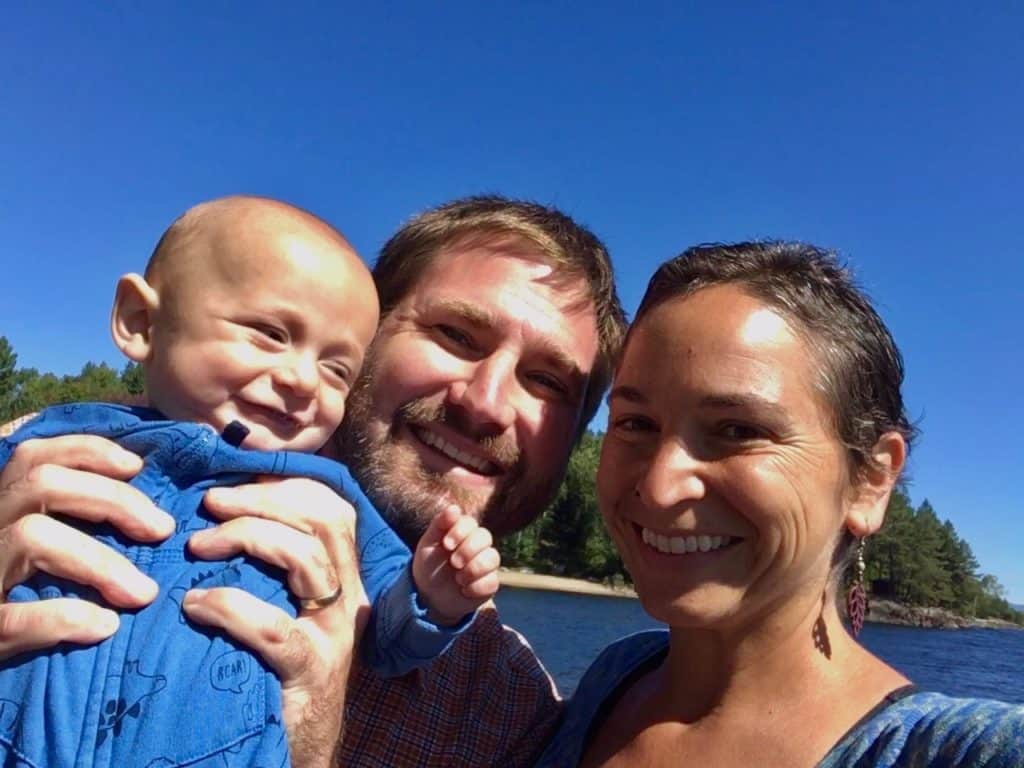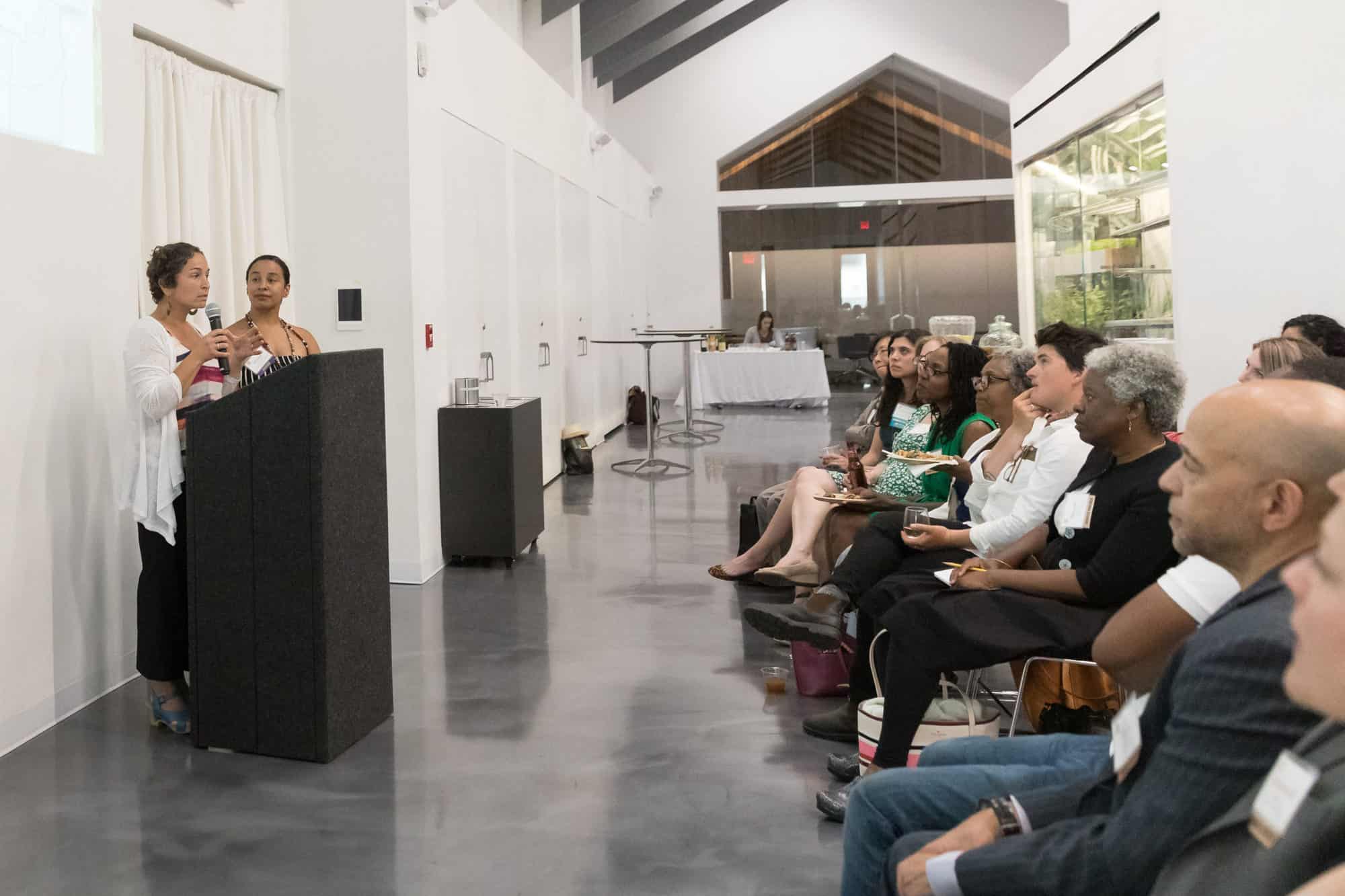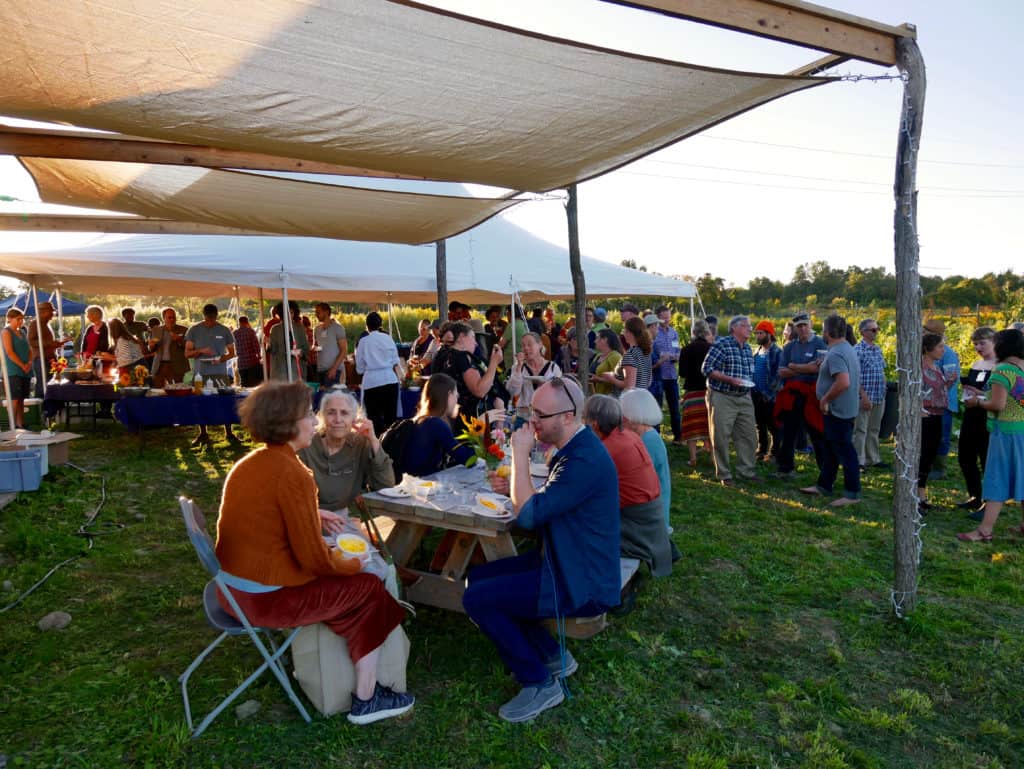
Instant Inspiration: Interview with Outgoing Executive Director, Elizabeth Gabriel
What was Groundswell like 6 years ago, when you first joined the team?
Elizabeth: 6 years ago, Groundswell was much smaller. Today, our annual budget is double what it was, our staff size is double, and our leadership has quadrupled, at least. Also, 6 years ago we were hyper local – which I do miss sometimes, however now, we are both nationally known and locally known and I believe we deserve that recognition (smile). One of my favorite things about Groundswell has always been that we are nimble. This could appear – and sometimes feel – like we’re ungrounded, but in actuality, being nimble has always enabled us to pivot to the needs of the community, to the interests of aspiring and beginning farmers and to the ever-changing climate and food system. This was true 6 years ago and still is true today. 6 years ago, our Farm Business Course was one of the only in the region, our Incubator Farm Program was one of the only in the New York State (ours was actually the first), we ran CRAFT and a Homesteader program, which we no longer have. Generally speaking, the resources and services available for beginning farmers were few and far between so we were pretty unique. Today, there are dozens of farmer training service providers just in our region, hundreds in the State. And although our mission always committed us to creating “equitable food systems”, today, what makes us unique and important is that we have a much clearer understanding of how to approach creating an equitable food system both as a white-led farming organization and in regards to the systemic and institutional racism that permeates food and farming.
How has Groundswell changed or grown over the years?
E: With the number of opportunities for beginning farmers to learn increasing, we’ve adjusted our programming to adapt over the years. Other organizations around the State support a lot of the technical needs of beginning farmers, which allowed us to shift our programming to support the needs of beginning farmers who have a harder time accessing the resources and knowledge they need to successfully farm because of systemic discrimination and marginalization. This shift brought opportunity and challenges and required both organizational development and growth for every person within Groundswell. We’ve made a lot of mistakes, and each one has helped us grow.
Farmers have always been a central voice guiding our work and while this remains true today, we now also have more voices guiding our work. I’m thrilled and grateful that the voices and involvement of people of color is central to our work and how we develop the programs and services we offer. With more time and new leadership, I hope this trend continues to impact how the organization is governed, how policies are made, how funding is secured and spent – and everything in between. It’s one of the reasons I’m leaving – to make more space for this to happen. Centering voices and needs of Black, Indigenous, People of Color and refugees has always been a goal, but given the racial background of who has led Groundswell, it took more time to actualize then expected and we needed to adjust our approach to our work and to relationship building in order for it to happen. Today we’re considered one of the leading beginning farmer training organizations in the country that is centering equity and justice in programs, not just in talk but in practice – and I couldn’t be more proud that this happened during my leadership. But this has been able to happen because our entire leadership is committed to our equity work, not just a few of us. And that demonstrated commitment has attracted more people to get involved! This is ideal. We still have a lot – a WHOLE LOT – more work to do in this realm, and I believe we’ll do it…. Or, I guess I should say, “they’ll do it” (smile).

What have you learned about leading a grassroots non-profit committed to justice and sovereignty?
E: Wow! I’ve learned so much. I gave a lot to this job and organization, but I’m sure I learned just as much! Moving at the speed of trust is essential and listening and relationship building is the most important thing you can spend your time on. Those are the new two main things.
I spoke to some of what I learned in the previous question, but to be more specific, Groundswell is a white-led nonprofit committed to justice in a sector (ie. farming) that is also predominantly white-led, and I’m a white cisgendered person, so my experience is specific to these circumstances. Analyzing and understanding my privilege and power as an individual was the start, and how my ways (and my education and experience and culture, etc.) uphold systemic white supremacy. Then, analyzing how Groundswell as an institution could leverage its privilege and power to effect systems change could begin to come next. This is another reason why being nimble is so important. It’s easier for us to be nimble because we’ve remained relatively small, but even large organizations can design themselves to be nimble and pivot to adapt to the needs of their stakeholders and to breakdown systems that don’t work. I’ll also add that no work is done alone. This wasn’t something I learned new, but I was constantly reminded at Groundswell. I’ve always been part of an amazingly dedicated staff team and over the years, I’ve been grateful for a small network of National colleagues I could lean on to bounce off ideas and work through and challenges (and also cry to or boast to).
How do you balance being a farmer and a full time Director?
E: I didn’t do it well, that’s for sure (laughs). Groundswell was far more than a full-time job. I tried having one day on the farm a week, but it was hard to keep up and it was hard not to always want to add more and have Groundswell do more. Evenings and weekends, I’d get to do some farming – move the sheep, harvest mushrooms, deliver our CSA – but being on the farm more is something I’m really looking forward to having time for. These days, I’m also balancing being a new mom, so I’ll have more time for that too (smile).
During your time at Groundswell, is there a particular moment or memory that stands out for you?
E: So many. I co-organized an Undoing Racism Training for 82 people, and we offered it free to farmers and Groundswell leadership. This changed Groundswell and how we approached our work. One of our staff retreats we held at a friend’s lake house was a highlight for sure, when we developed the idea of a Community Farm and compensated BIPOC Farmer Training Program, plus 3 of us swam in really cold water! Leah Penniman coming to lead a full-day workshop to 70+ people on Land Access was incredibly powerful and inspired the continuation of the Finger Lakes Land Access Reconciliation & Reparations Working Group. The Sunset Soiree and the Story Slam are highlights too. Both events are always filled with Groundswell’s people – farmers, community members, funders, friends, participants, staff and board, kids, musicians, storytellers, and more. So much about Groundswell and what I’ve loved is the network that makes Groundswell what it is. These events brought that network together to celebrate the abundance of our food system. And to eat and drink of course!

Is there an achievement or contribution that you are most proud of?
E: Yes, without sounding arrogant, there’s a few. I transitioned us from being fiscally sponsored to being an independent 501c3, which gives us more freedom to grow true to our mission and our Equity Statement. I think my leadership has laid the foundation for Groundswell to be around for the long haul and for beginning farmers training organizations to change the farming landscape so it’s more inclusive and anti-racist. Our commitment and action towards farm justice and integration of equity efforts in our work has led Groundswell to be well-known on a National level, all while still providing individualized guidance to local farmers. This has been a joy to see come into practice.
What do you think other people should know about this Groundswell, that they may not already know?
E: Hmmm. We do a lot and have big footprints, and we’re just a small, mighty staff of 5.
What do you think the future of Groundswell and the FLX food system will look like?
E: The Finger Lakes food system is incredibly abundant in so many ways, with exceptional regional farmers producing the best food imaginable. It’s one of the reasons I live here. But I think we’re missing some critical elements that would make the food system stronger, more resilient, more just and meet the needs of the people. This is one of the reasons it’s hard to leave Groundswell. I love systems thinking and there’s so much more work to do and I know the people are here who can make it happen! I’d love to see larger food hubs and aggregation efforts that support small farmers, and workforce development programs for farming and food jobs, and a coop that really prioritizes buying regionally. I hope there are more efforts to support land justice and land sovereignty for Black and Indigenous people.
Now that you’re leaving Groundswell, what’s next for you?
E: First and foremost, more time for my family, my farm and myself. I plan to continue to stay involved with some roles I started as a part of Groundswell and will continue as a volunteer, like facilitating Talking Circles on Race & Racism, staying a member of the FLX Land Access Working group and having time to be a speak as a member of the Soul Fire Farm Speakers Collective. I’ve been asked to work as a consultant with groups on organizational development and approaches to equity work and I’ve also taken a totally different kind of job as Editor & Writer of The Natural Farmer, a newspaper NOFA publishes. I’m excited to get back into detail oriented work like interviewing farmers and reading and writing about farming topics. I’ve committed to integrating justice into the paper and hopefully lead the paper to become a mechanism for NOFA to expand their role in food and farm justice.
Stay in touch with Elizabeth! Contact her here: ElizabethRGabriel at gmail dot com.
